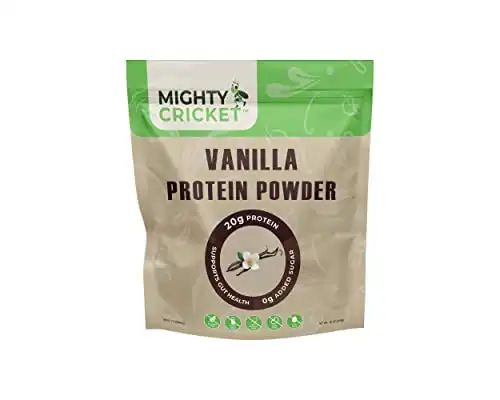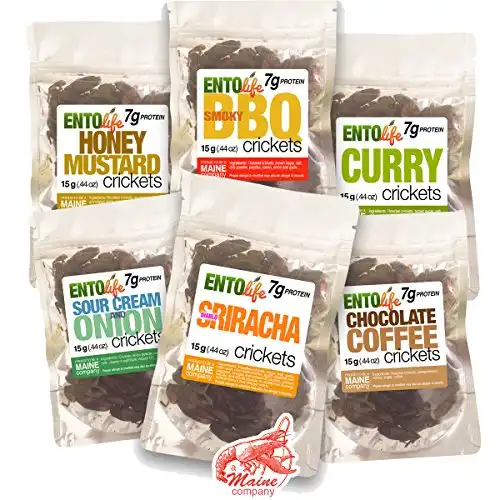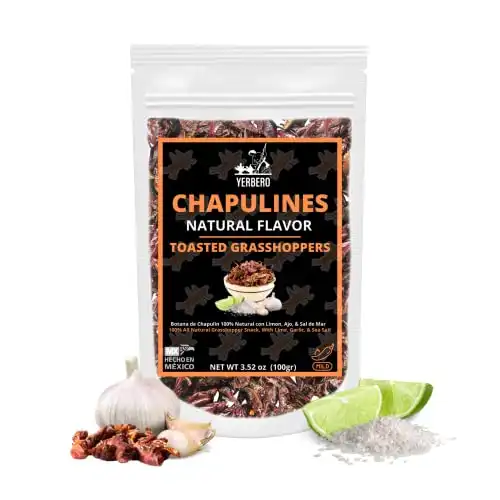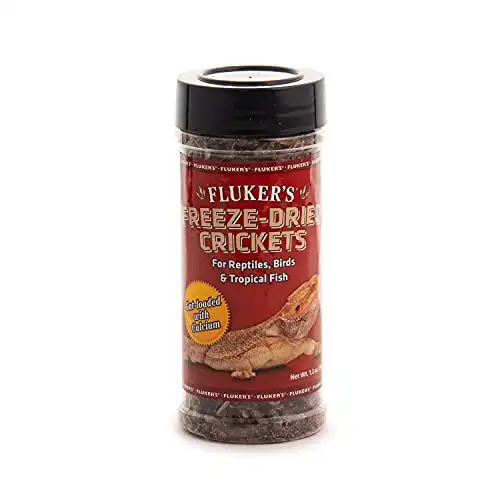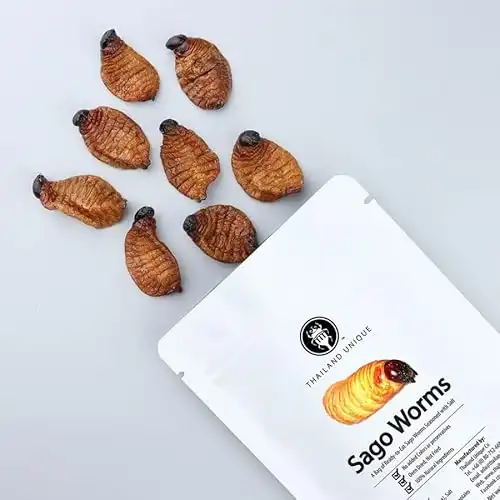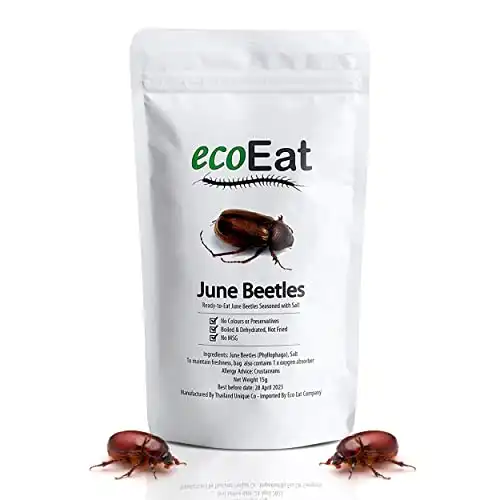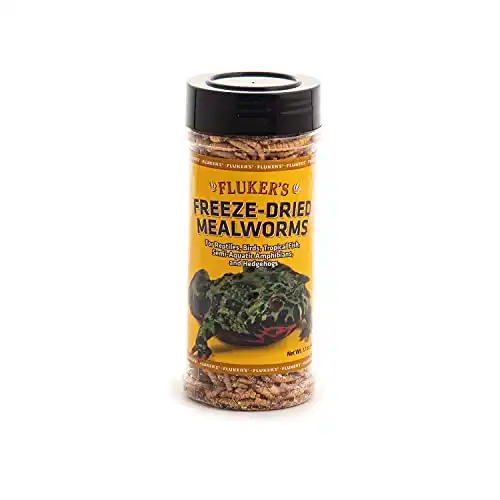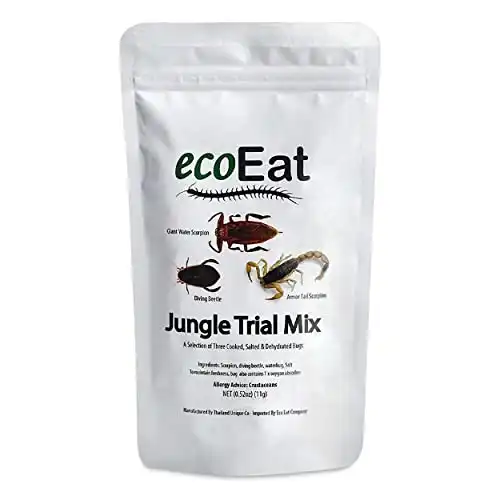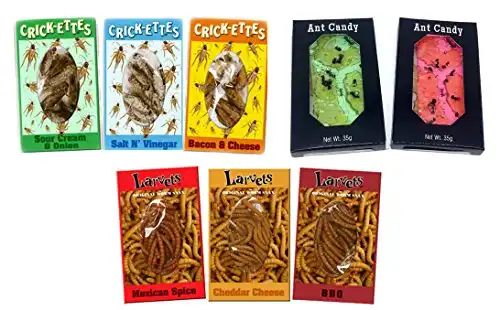15 Best Insects to Eat for a Healthy Protein Boost
Insects are a protein-packed, sustainable food source with a variety of flavors. From bacon-like bee grubs to nutty silkworms, there’s a bug for everyone!

Eating insects is nothing new—humans have been eating insects to stay healthy for centuries. More recently, people have chosen insects as a healthy and environmentally sustainable protein source. If you’ve never considered eating insects, you might wonder what insects taste the best.
Insects like bee grubs and cicada larvae are surprisingly tasty and nutritious, with flavors ranging from slightly sweet to shrimp-like. While the idea of eating insects may seem unappealing in the West, industrial-scale insect farming for human consumption is on the rise, offering a sustainable source of protein that even elite athletes embrace. We’ve curated a list of the best insects for a high-protein snack.
Disclosure: As an Amazon Associate, this site earns from qualifying purchases. Thank you!
1. Cricket Powder Packs Protein
If you’re thinking of adding insect protein to your diet, you might be squeamish about eating a whole insect. In that case, cricket powder is an excellent choice to introduce high-protein insects to your meals. This powder is made from the house cricket and has a milder taste than other cricket species.
Cricket powder is a protein powder made from finely ground roasted crickets. It has a nutty flavor and is a great way to add more protein to a meal. You can use it in smoothies and baking, and some edible insect retailers even have ready-made cricket brownie mixes.
2. Roasted Cricket Snacks
Once you’ve settled into eating cricket powder, try roasted crickets as a snack. Crickets are often a first choice in sustainable protein as it takes less water and feed to raise crickets than it would to get the equivalent protein from a mammal.
Whole crickets are dry-roasted to make a crunchy snack, and in the U.S., suppliers often have flavored cricket snacks, just like buying a pack of crisps. If you’re looking for a protein snack that is wheat, soy, and dairy-free, a serving of crunchy roasted crickets packs 13g of protein.
3. Delicious Mexican Grasshoppers
Grasshoppers have been one of the staples of Mexican cuisine since long before the Spanish arrived. Known as chapulines, these insects are delicious and rich in protein. When you buy them, they will usually have been dehydrated and roasted.
You can add extra crunch to them by tossing them in olive oil and roasting them in the oven. These days edible insects are becoming easier to source in the U.S., and companies like Merci Mercado keep chapulines in stock.
4. Crunchy, Sweet, and Nutty Silkworms
Try silkworm pupae with their crunchy outside and soft insides, a long-time staple of Korean and Thai cuisine. People say they have a sweet and nutty flavor reminiscent of almonds and hazelnuts. The interiors are said to have the same soft texture as mashed potatoes.
Silkworm pupae are a by-product of the silk industry, but as a food source, they make an excellent protein-packed snack. They are low in fat and contain essential fatty acids. They are an excellent source of high-quality protein, with 100g of dried silkworm pupae providing 55g of protein.
5. Salty Jamaican Crickets
If you want your insects to have a more gamey taste, like a nutty jerky with a touch of saltiness, try Jamaican Crickets. They are dehydrated and roasted instead of fried to keep the fat content lower. The fats they do contain are heart-healthy omega-3 fats.
Jamaican crickets are a popular snack in Thailand, containing up to 66% protein once dehydrated. Their crunchy, salty flavor with a hint of smoke gives them a unique umami flavor that appeals to people looking for a high-protein, crispy snack.
6. Savory Sago Worms
Sago worms are the larvae of the palm weevil or the Rhynchophoris ferrugineus. Try these delicacies of Southeast Asian cuisine, and they can be eaten live, toasted, or steamed. If you go on vacation to Vietnam, you may encounter the street food delicacy of live sago worms in fish sauce.
However, for most of us, that’s a little too much. A more palatable way of eating sago worms is to have them dried and served in a more crispy and less wriggling form. A fresh sago worm contains 10.34g of protein per 100g. However, these grubs are very fatty.
7. Calcium-Rich June Bugs
You can eat June beetles and their grubs, which are a good protein source. Thanks to their crunchy exoskeletons, June bugs are also an excellent source of calcium, though the grubs are better nutritionally. Some people use crushed dried June beetles in biscuits and baking for extra protein.
Indigenous people of northwest California used to eat fire-roasted June bugs. Still, the grubs can be dug up from the ground and made into a tasty meal. Here’s a great way to add June bugs to your diet – fry them until they are crunchy, then add them to your salad for a nutty, smoky burst of flavor.
8. A Mealworm Makes a Light Snack
Not only do mealworms make great food for many pets, but they also are completely safe for people. Mealworms are cheap to raise and have a light flavor, partly reminiscent of mushrooms and nuts. Mealworms are about 20% protein and have high levels of vitamin B12 and Zinc.
Buy precooked, dehydrated mealworms, or make them yourself. You can easily raise your own mealworms, then dry roast them for a few hours on low heat. Kill them humanely first by freezing them for 24 hours. Add salt or sugar to taste.
9. Salty-Sweet Water Bugs
If you’re looking for a unique taste, try the giant waterbug, which has been described as having a salty, umami flavor with hints of banana and melon. They can be eaten raw, or you may prefer them fried or steamed.
Giant water bugs, also known as edible water scorpions, are carnivorous pond insects. Their stiff outer wings are removed when prepared, and the delicious flight muscles taste similar to shrimp. You can eat the crispy outer wings if you prefer, but the head and legs are best avoided.
10. Meaty Cicada
Especially for those who prefer their insect meals a little meatier, female annual cicadas are an outstanding source of protein. Once dehydrated, they pack a massive 50% of protein. They have a nutty, delicate flavor and can be eaten whole or ground.
You can harvest them at the end of summer when the annual cicada emerges. The best ones to eat are the ones who have just shed to become adults when they are still pale. Freeze them first, then pan-fry, boil, or roast them. They are said to taste similar to shrimp and make great tempura.
11. Weaver Ant Toppings for Protein
The tiny weaver ant makes for an excellent crunchy topping to add protein to your salads and vegetables. The edible weaver ant is described as milder tasting than other ants, with a slightly fruity and almost sweet flavor.
Popularly served with rice dishes or eaten straight from the pack. They are considered among the most valuable edible insects as the ants and ant larvae are delicious and safe for humans to eat. In some countries, such as Thailand, they are so prized that they cost more per weight than beef.
12. Bacony Bees
Bees are definitely edible, but best eaten dried rather than life if you’d like to avoid a sting! Bees are often extracted from hives as part of the honey removal process and are said to have a mildly sweet, slightly earthy bacon flavor when fried.
Bees are usually eaten when still in their larval form; how crunchy they are depends on the cooking process. Bee grubs are high in fat and protein, and frying them will add to the fat content. Mature bees don’t taste as good as immature larvae.
13. Iron-Rich Black Soldier Fly
A fantastic insect to keep for animal and human food, the black soldier fly larvae is an excellent source of protein and iron. Often raised for animal feed, these sanitary grubs might be the next big thing in edible insects for humans, thanks to their many nutrients.
When cooked, the larvae are said to have a rich, earthy taste and smell like frying potatoes. They have a soft, meaty texture. You can easily farm black soldier flies, which are easy to keep. Roast or fry the larvae to have a nutritious and delicious protein-rich snack.
14. Spicy Red Termites
Consumed worldwide for their protein and nutty, rich taste, termites are an excellent source of protein, fats, and essential nutrients. They are sometimes eaten as a flavored, spicy snack with added pepper, soy sauce, or chili.
Prepare termites by pan-frying them or deep frying them; their high-fat content helps to give them a rich nutty flavor. They are second only to grasshoppers as a significant source of edible insects consumed by humans. They can also be boiled and dehydrated.
15. Sweet Almond Wax Worms
Opt for the wax worm if you want to try a sweeter insect. Wax worms are the caterpillars of a moth which is the bane of beekeepers. These larvae feed on honey and beeswax in hives. Thanks to their diet, they have a sweet taste reminiscent of almonds or pistachios.
You can source them from insect suppliers and even pet stores. You can add wax worms to cookie dough to give additional protein. Wax worms are great for braising, tend to pick up the flavor of whatever you use when cooking, and are excellent for sweeter dishes.
Frequently Asked Questions
What Is The Tastiest Bug?
The waxworm, the larvae of the wax moth, is said to be the sweetest and tastiest, thanks to its honey and beeswax diet.
What Is The Healthiest Insect To Eat?
Three insects are considered to have similar nutritional values, and all of them are better than meat for your nutrition needs. These are honeybees, crickets, and mealworms.
What Insect Is Eaten The Most?
Beetles are the insect most commonly consumed by humans, with data showing they make up 31% of human insect consumption worldwide.
What Edible Insect Actually Tastes Like Chicken?
Fried crickets taste a little like chicken, though with a slight nuttiness.

